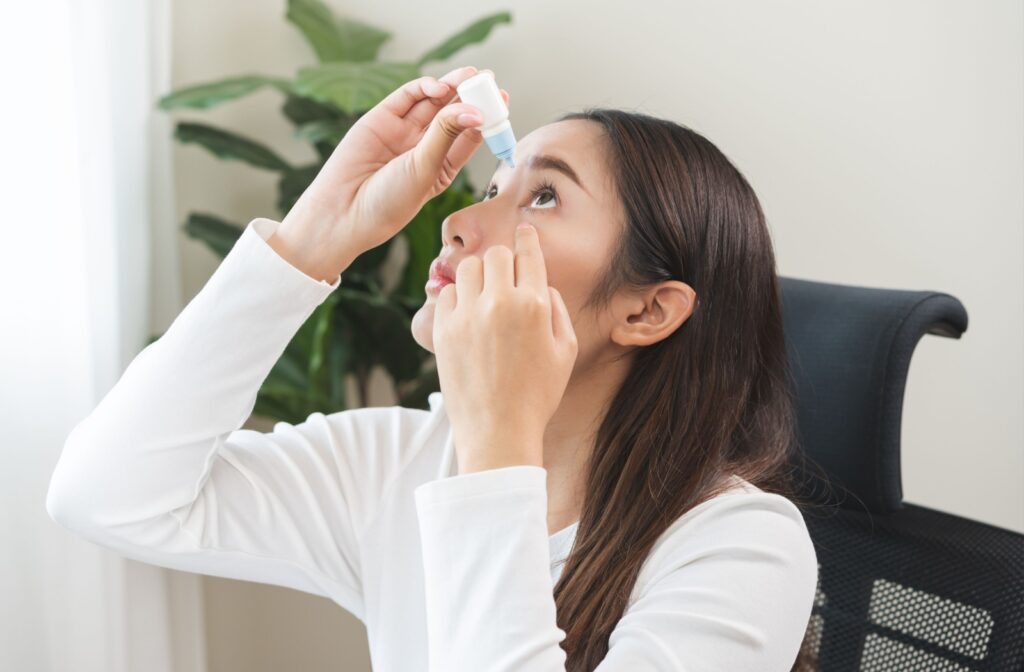For anyone who’s experienced the scratchy, itchy, or burning sensation in their eyes that comes with Dry Eye Syndrome (DES), you know firsthand how uncomfortable it can be. Now, imagine pairing that discomfort with a headache. But is there a connection between dry eyes and headaches? The answer isn’t as straightforward as it seems, but there is no evidence that dry eyes cause headaches directly.
Dry eye can have a huge impact and can be caused by other factors, such as digital eyestrain, and we are here to help you navigate dry eye symptoms and headaches.
What is Dry Eye Syndrome?
Dry Eye Syndrome occurs when your eyes don’t produce enough tears, or the tears evaporate too quickly, leaving your eyes insufficiently lubricated. These tears aren’t just about crying; they play a critical role in keeping your eyes hydrated, removing debris, and maintaining overall eye health.
Common symptoms of dry eyes include:
- Burning, stinging, or scratchy sensations
- Redness
- Sensitivity to light
- Difficulty wearing contact lenses
- Blurred vision or eye fatigue
While these symptoms are inconvenient enough on their own, many patients associate their Dry Eye Syndrome with frequent headaches. But how exactly are the two connected?
Can Dry Eye Syndrome Cause Headaches?
The direct scientific link between Dry Eye Syndrome and headaches is still a topic of active research. However, there are several ways in which dry eyes may contribute to or accompany headaches:
1. Eye Strain and Muscle Fatigue
When your eyes are dry, you may unconsciously squint or blink more often to keep your vision clear. This additional strain on the eye muscles can lead to discomfort and headache-like symptoms—often described as a dull, persistent ache around the eyes and forehead.
This phenomenon, closely associated with digital eye strain (sometimes called “computer vision syndrome”), is particularly common among professionals working long hours in front of screens.
2. Sensitivity to Light
One of the tell-tale symptoms of Dry Eye Syndrome is sensitivity to light (photophobia). Bright lights or glare can exacerbate this symptom, straining the eyes further and triggering headaches, especially for those prone to migraines.
3. Shared Triggers
Some underlying conditions that cause dry eyes may also play a role in triggering headaches:
- Dehydration: Both headaches and dry eyes can stem from insufficient hydration.
- Allergies: Seasonal allergens often irritate the eyes and sinus cavities, causing dryness and pressure headaches.
- Hormonal changes: Hormonal shifts (e.g., menopause or pregnancy) affecting tear production can also influence headaches.
- Environmental factors: Conditions like air-conditioned environments, prolonged screen exposure, or polluted air may simultaneously worsen dry eyes and lead to tension-type headaches.
4. Neurological Connection?
Emerging theories suggest a possible neurological link between the nerves in the eyes and the scalp. Miscommunications in tear-related functions or nerve signals might play a role in concurrent dry eye and headache symptoms, further opening the door for future studies.

Relief Tips for Dry Eyes and Headaches
While dealing with both dry eyes and headaches may feel overwhelming, relief is possible. Here are some practical approaches to managing symptoms:
1. Prioritize Eye Strain Relief
Reducing eye strain is crucial for relieving both Dry Eye Syndrome and related headaches:
- Follow the 20-20-20 rule: Every 20 minutes, look at something 20 feet away for at least 20 seconds. This habit gives your eyes a much-needed break from screens.
- Invest in blue light glasses: For professionals logging long hours on computers, glasses with blue-light blocking technology can reduce strain.
- Adjust screens and lighting: Position your screen slightly below eye level and reduce glare by using anti-glare coatings or adjusting the surrounding lighting.
2. Keep Eyes Properly Hydrated
Using artificial tears or eye drops specifically designed for Dry Eye Syndrome provides instant hydration and relief. Additionally, incorporating omega-3 fatty acids—found in fish or flaxseed oil—into your diet may improve natural tear production.
3. Incorporate Warm Compresses
Warm compresses can soothe dry eyes while also relaxing the facial muscles around your eyes and sinuses, alleviating pressure that contributes to headaches.
4. Stay Hydrated
Drink plenty of water throughout the day to prevent dehydration, which can worsen both dry eyes and headaches. Aim for at least 8 cups of water daily, adjusting based on factors like heat or physical activity.
5. Use a Humidifier
Dry indoor environments worsen Dry Eye Syndrome, especially in places with air conditioning or heating. A humidifier can help maintain moisture in the air, reducing irritation in your eyes and nasal passages—a common trigger for sinus headaches.
6. Consult a Specialist
If your symptoms persist, consider visiting an eye care professional or general physician. They can help identify whether specific treatments like prescription eye drops, punctal plugs, or medications might improve tear production. Additionally, if you’re prone to migraines, consulting a neurologist can ensure you’re treating the root causes effectively.
Proactively Protect Your Eye and Head Health
Can Dry Eye Syndrome cause headaches? While it doesn’t directly cause headaches, it can certainly contribute to them through strain, environmental triggers, and overlapping factors like dehydration or sinus issues.
The good news is that effective management strategies exist. Begin by reducing screen time, keeping your environment hydrated, and using tools like artificial tears to combat dryness. Most importantly, listen to your body—consult a specialist if either your Dry Eye Syndrome or headaches become persistent issues that disrupt daily life.
By addressing your symptoms holistically, you can move toward a healthier, strain-free, and headache-free lifestyle. To learn more about treating dry eye symptoms, book an appointment with Professional Eyecare Centers in various locations in North Dakota.
Have dry eye-related headaches been troubling you? Share your experience in the comments or ask us any questions you might have!




